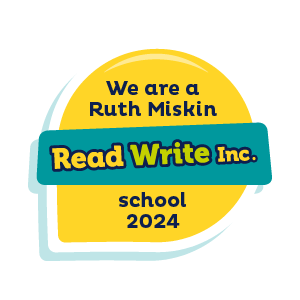Phonics and Early Reading
Intent
At Thorpe Primary School we want to create confident, skillful readers who have a life-long love of reading and can expertly apply their knowledge and understanding. We want pupils to be able to use their decoding skills when presented with new text, as well as build their fluency when reading aloud.
Phonics is taught daily in reception and key stage 1.
The Read Write Inc. curriculum is…..
The Read Write Inc. curriculum has been adapted for Thorpe by considering the context of our pupils and the community.
For example:
-
Pupils who are not in line with expectations are invited to a phonics breakfast in year 1
-
Pupils learn phonics through multiple lessons (morning and afternoon)
-
Pupils fluency has often not progressed inline with expectations, therefore strategies like echo reading are now included in some storybook timetables
Implementation
The implementation of Read Write Inc. for phonics reflects our broader teaching and learning principles:
For phonics in particular:
-
The phonics lead and EYFS lead assess children’s decoding ability once a half term.
-
The phonics lead, with support from the above adults, assigns each child to a RWI group based on their assessment outcomes.
-
In EYFS and year 1, the lowest 20% are informally assessed weekly.
-
Teachers and TAs in EYFS to year 2 teach RWI lessons daily.
-
Children in year 3 that need more support with their learning access RWI or Project X Code.
-
Speed sounds lesson daily within RWI lessons – focus on recognising and decoding single words, alongside spelling.
-
In EYFS and year 1, children take part in afternoon speed sound lessons every day.
-
Whole class and targeted pinny time is used in EYFS and KS1.
-
3-4 times per week children practise reading a RWI storybook which includes sounds they already know (practise what they know as a pose to what is new to them).
-
Phonics virtual classroom videos form the RWI portal are sent home once a week, in EYFS and KS1.
Impact
The careful sequencing of the curriculum – and how concepts are gradually built over time – is the progression model. If pupils are keeping up with the curriculum, they are making progress. Formative assessment is prioritised and is focused on whether pupils are keeping up with the curriculum.
Children are positive and confident about reading
-
Parents feel well-informed about how their children learn to read and how they are developing as a learner
-
Children progress by a RWI colour or more each half term
-
Children’s reading speed improves in line with the RWI colours (pink onwards, children should become quicker)
-
Attainment and progress continues to improve in line or above national average with the disadvantaged children attaining in line with their peers
We recommend watching the following Ruth Miskin videos from the dropdown menu:
- Understanding phonics
- What is RWI phonics
- How to say the sounds
- Sound blending
- 10 things to think about when you read to your child

